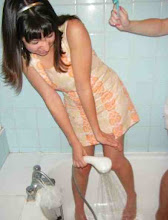Apparently last Saturday was the 100th International Women’s Day. I am a woman, and yet I was completely oblivious to this fact. Apparently some thousands of women marched through the centre of London, along the very same streets that I trod 24 hours later, guilt-shopping (it’s like comfort-eating, only where you substitute some niggling moral guilt for the more easily assuaged guilt of spending money on scarves and nail polish).
Reading The Independent’s celebratory feature on the women’s movement (well, celebratory insofar as pointing out still extant inequalities and producing lots of mini pie-charts of how badly off some/most women still are is celebratory), I began to feel a little left out. The feminist debate still rages, and so far I have opted out.
It’s never seemed to have much to do with me: I grew up in a home where Mother ruled, where Calamity Jane was the aspiration, where Barbie didn’t need Ken so long as she had a substantial wardrobe and where men, well men just weren’t around to cause any problems. During my teens, the place at the head of the table was more often than not occupied by the most important male in my life – Snoopy the cat.
University changed everything. I had never had to compete with boys before. A girls’ school education, girl guides, dance classes – none of these had prepared me for the discovery that in the ‘real world’, most of the authority figures (dead and alive) are Men. And that Men like to argue.
As a student faculty representative, I sat through many committee meeting discussions trying to unravel why, in a female-dominated subject, academic success nevertheless belonged to the male minority. It seemed simple and yet unsolvable: examiners rewarded those who took the plunge; amongst the reams of exam responses those which stood out would inevitably be those with the wildest and most uncompromising lines of argument. Balanced and consequentially cautious approaches wouldn’t stand a chance, conventionally female approaches wouldn’t stand a chance.
A girl a couple of years younger than me followed me from school to Cambridge, to the same college and the same subject. I think she too was startled at the differences between the High School for Girls and the Higher Education for Everyone. She once asked me, frustrated and bewildered, why we hadn’t been taught to argue the way the boys had – 'the way we were supposed to'.
It was also at university that I encountered openly sexist attitudes for the first time. My male friends compiled a spreadsheet (this was Cambridge, they were geeky as well as misogynistic) rating all eighty-odd girls in our college year. The qualities afforded ratings included Face, Legs, Breasts, How many pints before you’d sleep with them, Accessibility, and – my especial favourite – the Personality tick box: Yes or No.
Back then I wrote an article for the student paper on the facet of sexism which most affected me - which continues to affect me. Putting aside the rights and wrongs, dos and don’ts of promiscuity, language is against us girls. Whilst a guy who is frequently friendly with our sex is nothing worse than a ladies’ man, or a player, any girl who indulges in the same behaviour is likely to find sooner or later that ugly word slut creeping into her company.
For guys, it’s simply a game and you’re the players. Such a label does no damage; in fact often the opposite – it endows you with a little of the frisson of the game itself, the seductive eye-twinkle of the gambler. But for us girls, the appellation ‘slut’ is barely one step up from ‘whore’. Romping in the mire of immorality, with the ample bosom of a milkmaid and unfeasible amounts of underwear on display, the Slut is the nemesis of all Nice Girls, the one-best-forgotten of all Nice Boys, and ultimately the mere plaything of the Player.
Thursday, 11 March 2010
Subscribe to:
Post Comments (Atom)

No comments:
Post a Comment